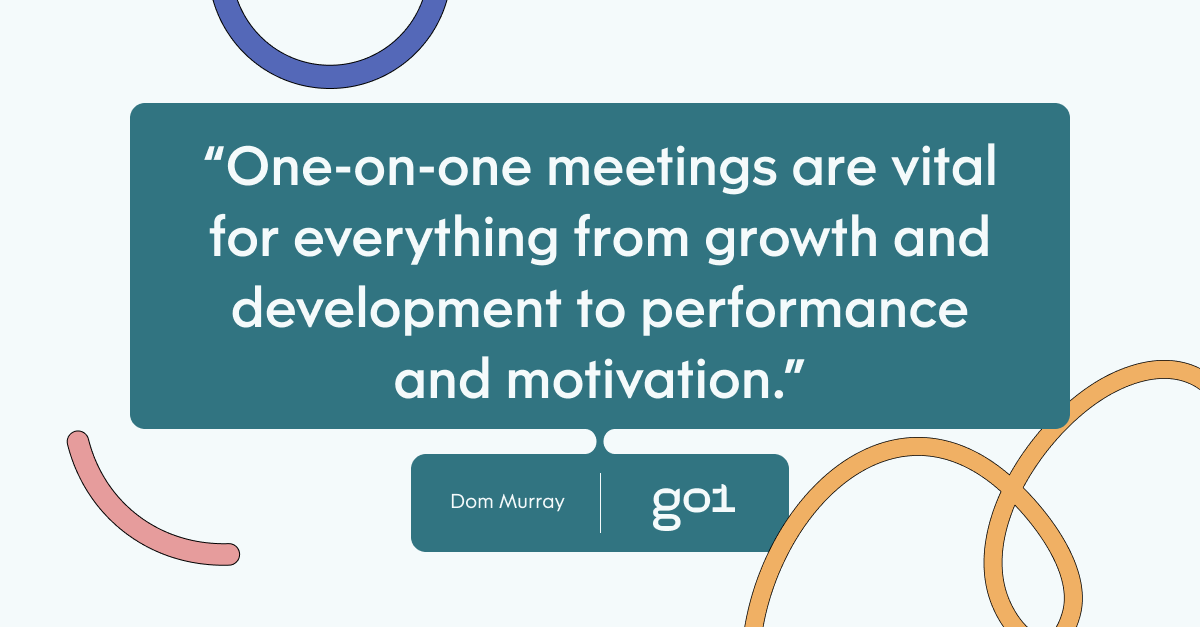
Questions you must ask your boss in one-on-one meetings

Your one-on-one meeting with your boss is your most important work meeting. There are many reasons for this, but, crucially, your relationship with your boss has a significant influence on your happiness, engagement, and success at work. However, has your boss has been trained in how to have effective one on one meetings? For that matter, have you?
One-on-one meetings are one of those vital life skills that they just don’t teach in school. While it might seem like an intuitive skill, many underlying tricks and nuances can help you get the most out of your one-on-one meetings. As such, we’ll explain why one-on-one meetings are so important, before analysing the skills you need to make your one-on-one meetings count.
Why are one-on-one meetings so important?
Hypercontext’s recent State of One-on-ones Report provides crucial insights into why one-on-one meetings are so important. After surveying more than 200 managers across 30 industries with 985 direct reports, they found that 94% of managers have regular one-on-one meetings, with 48.5% holding these meetings weekly.
The most common purpose of one-on-one meetings is to understand and eliminate roadblocks (70.4%), followed by a pulse check on how employees are feeling (60.7%), and status updates for specific projects (53.6%).
Further, those surveyed identified the following common topics that are discussed regularly in one-on-one meetings:
- Growth and development (75%)
- Performance (58%)
- Employee motivation (49%)
- Autonomy and accountability (45%)
- Alignment to company mission (23%)
Additionally, most managers agree that devising a one-on-one meeting agenda should be a shared responsibility. 49% of managers say that both the manager and the employee should contribute to the one-on-one meeting agenda, while 15% say that they own the meeting agenda but wish their employees would.

Finally, the top three challenges that managers face during one-on-one meetings are: ensuring they’re providing value to direct reports (34%), getting direct reports to contribute to the agenda (22%), and having meaningful, productive conversations (17%).
These statistics send two clear messages. Firstly, one-on-one meetings are vital for everything from growth and development to performance and motivation, underscoring why they are your most important meeting. Secondly, many managers wish that employees would take more control of driving one-on-one meetings.

Below, we’ll explore how employees can do exactly that.
How to make your one-on-one meetings count
You can’t always leave it up to your boss to tell you what you need to know. That’s not to say there’s anything wrong with your boss. It’s simply that they may be busy, distracted or — worst case — hasn’t received the proper training to manage employees.
Instead, take matters into your own hands by asking these essential questions in your next one-on-one meeting.
PS: This article includes content from the online course “One on One Meetings with your Boss.” Find out more here, or, access our course on How to manage your employees in 30 minutes a week.
1. Checking in with expectations
One of the most important steps to optimising your one-on-one meeting is checking in with your expectations. To get started, you might want to ask yourself some of the following questions:
- What am I doing that is working and why? Do you want more of this and how?
- What am I doing that needs to change? Why and how?
- What am I doing that I should stop doing?
- What do I want to get out of this meeting? How?
2. Growth, personal development, and career progression
Some bosses are great at developing their employees, while others, unfortunately, don't have a clue. Here are a few questions to ask your boss that will help you create a better future:
- What future roles do you see as suitable for my skill-set and career progression?
- What skills should I develop to do my job better?
- What skills should I develop to support my career progression?
- What responsibilities can I take over as part of career development or building my network/experience?
- Can you please give me X responsibility (because I think I can do a good job at it or it will develop my experience/network)? Some bosses prefer their employees to be proactive. If you want responsibilities, ask for them.
- Can you please support me in learning about X? (via coaching or sponsoring training - see 9 Ways to Get Your Company to Pay for Your Training. If you want training, ask for it specifically and justify why it supports your boss' goals.)
- What do you think my blind spots are that are holding me back?
- What do you think are my strengths that I should focus on?
- Are there any people I should develop a better network with? Would you introduce us or put us on a project together?
3. Aligning priorities
As Hypercontext’s report identified, alignment to the company’s mission is one of the most commonly discussed topics in one-on-one meetings. To ensure you’re aligned with your manager’s priorities, try asking the following during your next one-on-one meeting:
- What is the highest priority for you right now?
- What items are a lower priority? What's the possibility of these being cancelled/postponed indefinitely?
- My workload is currently at capacity, is there anything we could reshuffle or reprioritise to help with this?
- Are there any upcoming priorities that I should be aware of?
- Are there any tools we could use to help align priorities more smoothly?
- Do you think I do a good job at prioritising? Is there anything I should be doing to upskill in this area?
- Is there anything I need to know about you, the team, or the business?
4. Resources
To do your job effectively and efficiently, you need access to a variety of tools and resources. If a lack of resources is blocking your progress, it’s important to bring this up in your one-on-one meeting. For instance:
- I am struggling with project X, do you think we could source a new tool to help with this?
- Are there any areas you have noticed where we are lacking in resources?
- I am trying to achieve X, can you please help me with Y because of Z?
5. Bonus: Being helpful
These questions will show your boss that you're on their side and want to make a meaningful contribution.
These questions will also help you understand your boss better and build a better working relationship with your boss.
- What can I help you with?
- What are you struggling with?
- What are you trying to achieve?
- Is there anything I can do to help the team run more smoothly?
- How can I support you with your boss?
Need some support with your one-on-one meetings? Go1 can help. Start your free trial today to access dedicated courses on Making your meetings more effective, Managing productive meetings, and many more.
For more insights, be sure to subscribe to the Go1 newsletter to stay on top of all the latest L&D trends. Or, you can book a demo today to find out how Go1 can help with your team’s learning needs.




